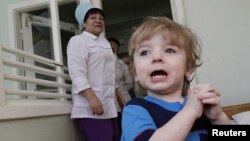Russia's State Duma, or lower house of parliament, has approved a ban on Americans adopting Russian children.
The bill, passed Friday in its third and final reading by a vote of 420 - 7, now goes to the upper house of parliament for approval
The ban on U.S. adoptions is in retaliation for a U.S. law that imposes sanctions on Russian officials suspected of human rights violations.
Russian President Vladimir Putin has said the State Duma's move is an "emotional" response to the new U.S. law. He said he would consider signing the bill only after seeing the final text.
Some analysts expect Mr. Putin would make changes to the bill before signing it into law.
The Russian bill is named after Dima Yakovlev, a Russian boy who died in 2008 after his adoptive family left him locked in a car for several hours during a hot day.
The new U.S. law is named after Sergei Magnitsky, a Russian anti-corruption lawyer who died in prison in 2009 after exposing an official corruption ring involved in the embezzlement of $250 million in tax money. The law was approved as part of legislation that lifted trade restrictions on Russia dating back to the Cold War era
The bill, passed Friday in its third and final reading by a vote of 420 - 7, now goes to the upper house of parliament for approval
The ban on U.S. adoptions is in retaliation for a U.S. law that imposes sanctions on Russian officials suspected of human rights violations.
Russian President Vladimir Putin has said the State Duma's move is an "emotional" response to the new U.S. law. He said he would consider signing the bill only after seeing the final text.
Some analysts expect Mr. Putin would make changes to the bill before signing it into law.
The Russian bill is named after Dima Yakovlev, a Russian boy who died in 2008 after his adoptive family left him locked in a car for several hours during a hot day.
The new U.S. law is named after Sergei Magnitsky, a Russian anti-corruption lawyer who died in prison in 2009 after exposing an official corruption ring involved in the embezzlement of $250 million in tax money. The law was approved as part of legislation that lifted trade restrictions on Russia dating back to the Cold War era





